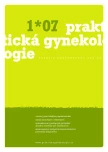-
Medical journals
- Career
Optimal management in patients undergoing caesarean section in spinal anaesthesia
Authors: MUDr. Marek Ľubušký; Ph.D. 1; MUDr. Emil Berta 2; MUDr. Martin Procházka; Ph.D. 1; MUDr. Oldřich Marek 2; prof. MUDr. Milan Kudela, CSc. 1
Authors‘ workplace: Gynekologicko-porodnická klinika LF UP a FN Olomouc 1; Klinika anestezie a resuscitace LF UP a FN Olomouc 2
Published in: Prakt Gyn 2007; 11(1): 11-15
Overview
At absence of contra-indications spinal blockade is prefered method of anaesthesia for patients undergoing caesarean section. Incidence of post-dural puncture headache (PDPH) is significantly higher in pregnant women and in puerperal period compared to general population. Use of appropriate needles for spinal blockade and adequate level of anaesthesiologist´s skills lead to lower incidence of PDPH after caesarean section performed in spinal anaesthesia.
Key words:
caesarean section, spinal blockade, post-dural puncture headache, PDPH, epidural blood patch
Sources
1. Weir EC. The sharp end of the dural puncture. Br Med J 2000; 320 : 127-128.
2. Reynolds F. Dural puncture and headache. Br Med J 1993; 306 : 874-876.
3. Leibold RA, Yealy DM, Coppola M et al. Post-dural-puncture headache: characteristics, management, and prevention. Ann Emerg Med 1993; 22 : 1863-1870.
4. Costigan SN, Sprigge JS. Dural puncture: the patients’ perspective. A patient survey of cases at a DGH maternity unit 1983-1993. Acta Anaesthesiol Scand 1996; 40 : 710-714.
5. Vandam LD, Dripps RD. Long-term follow up of patients who received 10098 spinal anesthetics. JAMA 1956; 161 : 586-591.
6. Grant R, Condon B, Hart I et al. Changes in intracranial CSF volume after lumbar puncture and their relationship to post-LP headache. J Neurol Neurosurg Psychiatry 1991; 54 : 440-442.
7. Cruickshank RH, Hopkinson JM. Fluid flow through dural puncture sites. An in vitro comparison of needle point types. Anaesthesia 1989; 44 : 415-418.
8. Ready LB, Cuplin S, Haschke RH et al. Spinal needle determinants of rate of transdural fluid leak. Anesth Analg 1989; 69 : 457-460.
9. Flaatten H, Rodt SA, Vamnes J et al. Postdural puncture headache. A comparison between 26-gauge and 29-gauge needles in young patients. Anaesthesia 1989; 44 : 147-149.
10. Geurts JW, Haanschoten MC, van Wijk RM et al. Post-dural puncture headache in young patients. A comparative study between the use of 0.52 mm (25-gauge) and 0.33 (29-gauge) spinal needles. Acta Anaesthesiol Scand 1990; 34 : 350-353.
11. Hoskin MF. Spinal anaesthesia - the current trend towards narrow gauge atraumatic (pencil point) needles. Case reports and review. Anaesth Intens Care 1998; 26 : 96-106.
12. Kang SB, Goodnough DE, Lee YK et al. Comparison of 26-G and 27-G needles for spinal anesthesia for ambulatory surgery patients. Anesthesiology 1992; 76 : 734-738.
13. Sharma SK, Gambling DR, Joshi GP et al. Comparison of 26-gauge Atraucan and 25-gauge Whitacre needles: insertion characteristic and complications. Can J Anaesth 1995; 42 : 706-710.
14. Green HM. Lumbar puncture and the prevention of post puncture headache. JAMA 1926; 86 : 391-392.
15. Patin DJ, Eckstein EC, Harum K et al. Anatomic and biomechanical properties of human lumbar dura mater. Anesth Analg 1993; 76 : 535-540.
16. Fink BR, Walker S. Orientation of fibers in human dorsal lumbar dura mater in relation to lumbar puncture. Anesth Analg 1989; 69 : 768-772.
17. Reina MA, de Leon-Casasola WA, Lopez A et al. An in vitro study of dural lesions produced by 25-gauge Quincke and Whitacre needles evaluated by scanning electron microscopy. Reg Anest Pain Med 2000; 25 : 393-402.
18. Dittman M, Schafer HG, Ulrich J et al. Anatomical re-evaluation of lumbar dura mater with regard to postspinal headache. Effect of dural puncture. Anaesthesia 1988; 43 : 635-637.
19. Flaatten H, Rodt SA, Vamnes J et al. Postdural puncture headache. A comparison between 26-gauge and 29-gauge needles in young patients. Anaesthesia 1989; 44 : 147-149.
20. Dittman M, Schafer HG, Renkl F et al. Spinal anaesthesia with 29 gauge Quincke point needles and post-dural puncture headache in 2378 patients. Acta Anaesthesiol Scand 1994; 38 : 691-693.
21. Pařízek A et al. Porodnická analgézie. Praha: Grada Publishing 2002 : 303.
22. Jones RJ. The role of recumbancy in the prevention and treatment of postspinal headache. Anesth Analg 1974; 53 : 788-795.
23. Mosavy SH, Shafei M. Prevention of headache consequent upon dural puncture in obstetric patient. Anaesthesia 1975; 30 : 807-809.
24. Crawford JS. Experiences with epidural blood patch. Anaesthesia 1980; 35 : 513-515.
25. Tom DJ, Gulevich SJ, Shapiro HM et al. Epidural blood patch in the HIV-positive patient. Review of clinical experience. San Diego HIV Neurobehavioral Research Center. Anesthesiology 1992; 76 : 943-947.
26. Hebl JR, Horlocker TT, Chantigian RC et al. Epidural anesthesia and analgesia are not impaired after dural puncture with or without epidural blood patch. Anesth Analg 1999; 89 : 390-394.
27. Ľubušký M, Berta E, Procházka M et al. Vývoj incidence postpunkční cefalei po spinální anestezii pro císařský řez v Olomouci v letech 2003-2004. Čas Lék Čes 2006; 145 : 204-208.
28. Spriggs DA, Burn DJ, French J et al. Is bed rest useful after diagnostic lumbar puncture? Postgrad Med J 1992; 68 : 581-583.
Labels
Paediatric gynaecology Gynaecology and obstetrics Reproduction medicine
Article was published inPractical Gynecology

2007 Issue 1-
All articles in this issue
- Optimal management in patients undergoing caesarean section in spinal anaesthesia
- Bronchial Asthma in Pregnancy
- Amniocenthesis: safe invazive method in prenatal diagnostics
- Rooming in
- Vaccination against human papillomaviruses
- The correlation of the native mammography and histology of the breast cancer
- Practical Gynecology
- Journal archive
- Current issue
- Online only
- About the journal
Most read in this issue- Bronchial Asthma in Pregnancy
- Optimal management in patients undergoing caesarean section in spinal anaesthesia
- Rooming in
- Amniocenthesis: safe invazive method in prenatal diagnostics
Login#ADS_BOTTOM_SCRIPTS#Forgotten passwordEnter the email address that you registered with. We will send you instructions on how to set a new password.
- Career

